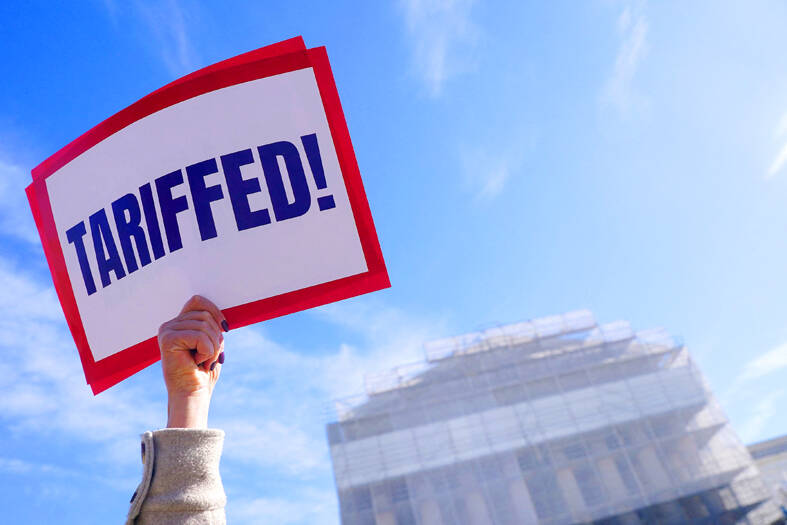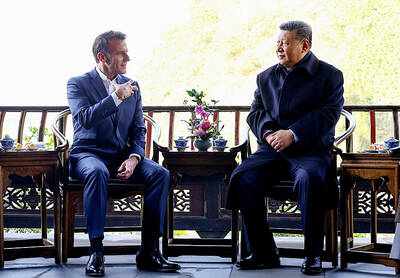The US Supreme Court’s tough questioning of US President Donald Trump’s global tariffs fueled increased speculation that they would be struck down, but raised the specter of additional chaos as he is widely expected to shift to other trade tactics in the wake of an adverse ruling.
On Wednesday during oral arguments, Supreme Court justices cast doubt on Trump’s authority to impose tariffs under the 1977 International Emergency Economic Powers Act (IEEPA), which contains no references to tariffs — only language on regulating imports during national emergencies declared by the US president.
Three conservative justices raised questions about whether an emergency law gives Trump near-limitless power to set and change duties on imports, with potentially trillion-dollar implications for the global economy. The court’s three liberal justices also appeared dubious, so at least two conservative votes could limit Trump’s tariff power under the law.

Photo: Reuters
Justice Neil Gorsuch, who Trump nominated to the court in 2017, appeared concerned that Trump’s assertion that he could impose tariffs by declaring a national emergency could shift too much congressional power to the president on an issue that helped spark the American Revolution.
“It’s a one-way ratchet toward the gradual, but continual accretion of power in the executive branch and away from the people’s elected representatives,” he said, later suggesting the “power to reach into the pockets of the American people” must be “done locally, through our elected representatives.”
Chief Justice John Roberts raised questions about whether the emergency-power law allowed for tariffs on “any product, from any country, in any amount, for any length of time.”
Justice Amy Coney Barrett, also a Trump nominee, pressed the government on the broad range of Trump’s action.
“Spain? France? I mean, I could see it with some countries, but explain to me why as many countries needed to be subject to the reciprocal tariff policy,” she said.
“Based on the questions posed by the justices, the IEEPA tariffs appear to be in jeopardy,” said Damon Pike, a principal with BDO USA’s customs and trade services practice.
All the court’s justices, except Samuel Alito and Clarence Thomas, “seemed skeptical that IEEPA gives President Trump the power to levy unlimited tariffs on every product imported from every country around the world,” he added.
However, Pike said that if the Trump administration loses, it would simply invoke other trade laws, a view widely shared by trade lawyers, senior Trump administration officials, importing companies and analysts.
The groups had just started to get used to the idea of a somewhat more stable trade environment, bolstered by a new year-long US-China trade truce and more US deals with Southeast Asian countries that reduced the IEEPA tariff rates to more manageable levels.
Companies have clamored for certainty and predictability on tariffs so that they can plan their investments, but Conference Board policy executive David Young said he did not see relief in sight.
“We’ve still got no clarity — CEOs remain kind of precariously positioned around what the future looks like,” said Young, who briefed about 40 CEOs following the Supreme Court arguments. “Even if it goes against IEEPA, the uncertainty still continues.”
A ruling is unlikely before early next year, he said, and companies are totally in the dark about potential refunds of the more than US$100 billion in IEEPA tariffs paid so far if Trump loses.
The issue of refunds was raised by Barrett, who said that it “could be a mess” for the courts to administer refunds to US importers who have paid tariffs that were declared illegal.
Neal Katyal, a lawyer representing five small businesses challenging the tariffs, said that the firms would get their refunds automatically if the court ruled against the Trump administration, but all other companies would have to lodge administrative protests to get money back.
“It’s a very complicated thing” that could take a long time, he added.

PARLIAMENT CHAOS: Police forcibly removed Brazilian Deputy Glauber Braga after he called the legislation part of a ‘coup offensive’ and occupied the speaker’s chair Brazil’s lower house of Congress early yesterday approved a bill that could slash former Brazilian president Jair Bolsonaro’s prison sentence for plotting a coup, after efforts by a lawmaker to disrupt the proceedings sparked chaos in parliament. Bolsonaro has been serving a 27-year term since last month after his conviction for a scheme to stop Brazilian President Luiz Inacio Lula da Silva from taking office after the 2022 election. Lawmakers had been discussing a bill that would significantly reduce sentences for several crimes, including attempting a coup d’etat — opening up the prospect that Bolsonaro, 70, could have his sentence cut to

A plan by Switzerland’s right-wing People’s Party to cap the population at 10 million has the backing of almost half the country, according to a poll before an expected vote next year. The party, which has long campaigned against immigration, argues that too-fast population growth is overwhelming housing, transport and public services. The level of support comes despite the government urging voters to reject it, warning that strict curbs would damage the economy and prosperity, as Swiss companies depend on foreign workers. The poll by newspaper group Tamedia/20 Minuten and released yesterday showed that 48 percent of the population plan to vote

A powerful magnitude 7.6 earthquake shook Japan’s northeast region late on Monday, prompting tsunami warnings and orders for residents to evacuate. A tsunami as high as three metres (10 feet) could hit Japan’s northeastern coast after an earthquake with an estimated magnitude of 7.6 occurred offshore at 11:15 p.m. (1415 GMT), the Japan Meteorological Agency (JMA) said. Tsunami warnings were issued for the prefectures of Hokkaido, Aomori and Iwate, and a tsunami of 40cm had been observed at Aomori’s Mutsu Ogawara and Hokkaido’s Urakawa ports before midnight, JMA said. The epicentre of the quake was 80 km (50 miles) off the coast of

RELAXED: After talks on Ukraine and trade, the French president met with students while his wife visited pandas, after the pair parted ways with their Chinese counterparts French President Emmanuel Macron concluded his fourth state visit to China yesterday in Chengdu, striking a more relaxed note after tough discussions on Ukraine and trade with Chinese President Xi Jinping (習近平) a day earlier. Far from the imposing Great Hall of the People in Beijing where the two leaders held talks, Xi and China’s first lady, Peng Liyuan (彭麗媛), showed Macron and his wife Brigitte around the centuries-old Dujiangyan Dam, a World Heritage Site set against the mountainous landscape of Sichuan Province. Macron was told through an interpreter about the ancient irrigation system, which dates back to the third century